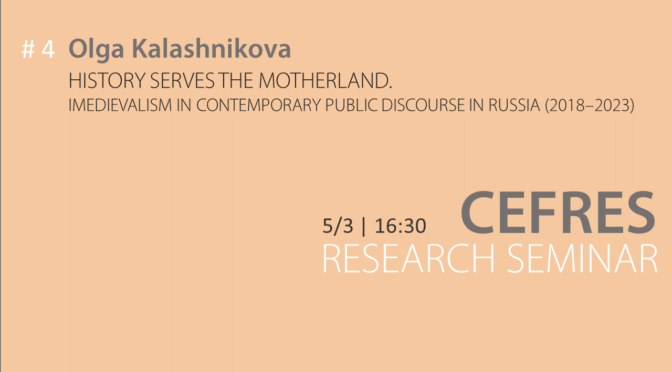History serves the Motherland:
Medievalisms in contemporary public discourse in Russia (2018–2023)
4th session of CEFRES in-house seminar
Through the presentation of works in progress, CEFRES’s Seminar aims at raising and discussing issues about methods, approaches or concepts, in a multidisciplinary spirit, allowing everyone to confront her or his own perspectives with the research presented.
Location: CEFRES Library
Date: Tuesday, March 5, 2024 at 4:30 pm
Language: English
Contact / To register: cefres[@]cefres.cz
Discussant: Martin ŠORM, Center for Medieval Studies, FLÚ, Czech Academy of Sciences
Olga Kalashnikova (CEFRES / CEU)
Abstract
Although popular culture often perceives medievalisms as harmless common beliefs and expectations about the Middle Ages, some medieval-alike clichés can effectively operate as a powerful educative medium in contemporary societies. Since 2012, throughout several “conservative turns”, the Russian state has persistently aimed to turn its public discourse into the metanarrative about a powerful “tsardom” and restoration of a Russian glorious past with “traditional Orthodox values”. As a result, the often-romanticized picture of the Russian Middle Ages became a crucial part of this ideological endeavor. This trend only intensified during the crisis of presidential authority in 2020-2021 and became steadily evident after the outbreak of a full-scale invasion of Ukraine in 2022.
My presentation will focus on how the contemporary Russian state reinterprets the Middle Ages in its public discourse. It thus aims to provide the taxonomy of medievalist commonplaces that are reproduced in the Russian milieu and their supposed meaning-making. Combining the contextual overview of the Russian historical memory politics during Putin’s fourth presidential term (2018-2024) with the discourse analysis of state-affiliated newspapers, I argue that the state’s medievalist discourse transmitted through amicable media outlets primarily seeks to ‘mobilize the Middle Ages’ in order to advocate anti-democratic political transformations on three semantic levels. First, by carefully orchestrating ideas about the sublime Russian Middle Ages, the state asserts that the Russian long-standing ‘civilizational model’ offers a more appealing alternative to Western “corrupted” and “barbaric” democracies. Next, it stresses the necessity for political centralization through references to despotic but just medieval kings and thus undermines existing human rights and promotes social inequality. Finally, the public reconsideration of the medieval past aims at activating patriotic mobilization on a personal level of Russian citizens.
See the complete program of 2023–2024 seminar here

